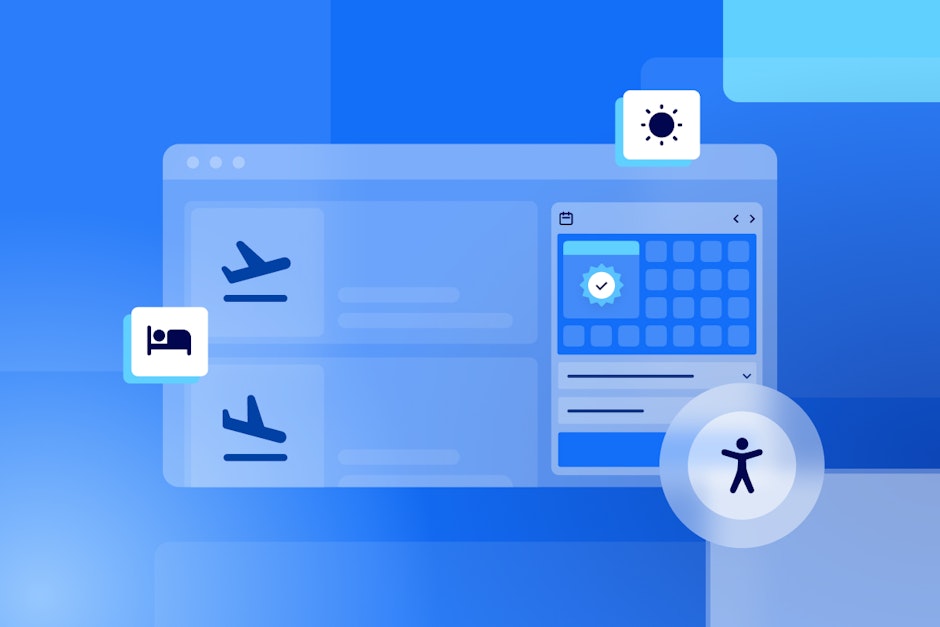Travel website accessibility: The secret to agencies maximizing client revenue online
The summer season is a big time for travel

People with disabilities, who make up over 1 billion people globally, spend about $95bn every year on travel, and the majority of them are attempting to book travel arrangements and hotel accommodations on the web, just like everyone else. If you have clients in the hospitality and travel industries who still have inaccessible websites, that’s a piece of the profit pie they can no longer afford to miss out on. Before the summer season heats up, you can open the door for your clients to welcome guests and travelers of all abilities to book online.
Let’s get this out of the way: it’s the law
Your clients’ websites (whether they be a hotel, airline, tourist attraction, or cruise site) need to be accessible according to the United States Americans with Disabilities Act (ADA), and other worldwide regulations in the EU, because they’re considered resources that aid places of public accommodation. In fact, websites without accessibility features are considered to be violating basic human rights because of a lack of access to online information for people with disabilities. To put it simply, it’s just not cool to exclude people with disabilities from websites, and that includes travel and trip accommodations.
Not only is it exclusionary, but your clients’ inaccessible hospitality and travel sites could also be at risk of a lawsuit. In fact, hotel booking websites are currently at a higher risk of ADA lawsuits in comparison to other industries, with the largest month-to-month lift in website ADA-related cases as of 2019. Becoming accessible mitigates the risk of litigation which is costly and daunting for businesses.
What makes a travel or hospitality website more accessible?
For starters, your clients’ websites need to have cut-and-dry navigation capabilities, so that travelers with disabilities can plan and book trips relatively quickly and efficiently at the same speed as other users, and without added delay. This means ensuring web compatibility with screen readers that are used by people who are blind, as well as other assistive technologies like keyboard navigation for those with mobility disabilities. Assistive technology users require a clean user experience in ways that web developers might not know intuitively, like heading, page structure, and font adjustments.
Virtual calendars and date-selection platforms also need to be accessible to anyone with a disability confirming a hotel stay or booking a flight through an airline. These are one of the hardest types of forms to navigate when inaccessible; if websites are not compatible with voice recognition software that assists in choosing dates on virtual calendars, the conversions or reservation transactions on your clients’ websites could be severely impacted. Travelers who are trying to book a hotel stay or a flight through your clients’ sites, and are faced with inaccessible forms, will just exit and move on to a different site that is accessible and accepts their business.
Those with invisible disabilities also need to be included in hospitality and travel websites, but in other, varying manners. For example, a person with dyslexia should be given the opportunity to understand any summer deals or bargains highlighted on your clients’ websites. Accessible websites and their user experiences typically ensure that proper adjustments are made to copy so users with dyslexia can get the full scope of the content. Just as someone using a screen reader requires alt text behind an image with sales taglines that are part of the visual, an accessible website will host alt text and make sure that it is dictated to the user, allowing for full context and comprehension of say, a banner promoting “20% off”. Without accessibility features that meet these characteristics’ needs, your clients will lose these travelers’ business altogether.
How can you prepare your clients’ sites for the summer season?
There are several ways in which you can prepare your clients’ websites for the imminent summer season, but here are our top three to get you started:
1. Audit their website
To get a thorough understanding of where your clients’ websites stand right now, you can paste their URL into accessiBe's free auditing tool and receive a comprehensive rundown in just a few seconds. This audit covers all accessibility issues and errors as they currently exist and lays out a plan to tackle problems and become a website that welcomes everyone.
2. Integrate a web accessibility solution into their website
AI-powered solutions like accessWidget make web accessibility a seamless, business-friendly practice. A tool like accessiBe’s can be installed in just a few minutes and performs accessibility maintenance every 24 hours, automatically, so your clients can feel assured that their website is inclusive and compliant, even with ongoing updates.
3. Perform user testing
One of the best ways to make sure your clients’ websites are accessible (and ready for a season full of booked summer accommodations) is to have a user with a disability test your website and spot any barriers that may still exist and need to be adjusted on your website. User testing is also offered by accessiBe if you want to ensure that every traveler on your clients’ websites is able to book.
Web accessibility can meet everyone’s wanderlust wishes
Aside from the fact that your clients’ websites need to be accessible for legal reasons, it’s a smart business move that can ensure quarterly success over the summer high season. Most importantly, people with disabilities should be able to access any platform, form, or service and that includes travel-related websites. Your clients’ sites could be the gateway that brings them both an accessible experience and an unforgettable trip that brings them back to book their next adventure.

